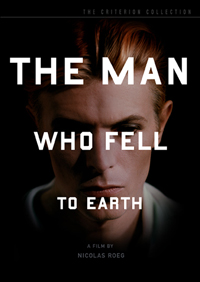|
Reviews of Recent Independent, Foreign, & Documentary Films in Theaters and DVD/Home Video
Directed by: Nicolas Roeg. Produced by: Michael Deeley & Barry Spikings. Written by: Paul Mayersberg, based on the novel by Walter Tevis. Director of Photography: Anthony Richmond. Edited by: Graeme Clifford. Music by: John Phillips. Released by: Criterion. Country of Origin: UK. 139 min. Not Rated. With: David Bowie, Rip Torn, Candy Clark, Buck Henry, Bernie Casey & Jackson D. Kane. DVD Features: Commentary by Roeg, Bowie & Henry. Interview with screenwriter Mayersberg. "Performance," interviews with Clark & Torn. Audio interviews with costume designer May Routh & production designer Brian Eatwell. Audio interview with Tevis. Still galleries. Poster gallery of Roeg's films. Trailers. Optional English subtitles. Tevis' original novel. Twenty-eight page booklet with a new essay by critic Graham Fuller & novelist Jack Matthews' appreciation of Tevis.
On the DVD packaging of David Bowie's film debut, photographs of the rock star are plentiful enough to make you wonder whether they’re meant to hide a lackluster product. But it would be a mistake to judge this boxed set by its slick presentation. The film remains a compelling love story with socio-political relevance. Screenwriter Paul Mayersberg, in an interview taped exclusively for the DVD, puts it this way, “[The Man Who Fell to Earth] uses science fiction for a look at the U.S. I took an emotional story with a science fiction background which made the love story…human.”
The American version of the film was much maligned by director Nicolas Roeg, who felt the edits left the movie choppy and difficult to follow. (This release contains the uncut British version.) Truth is, even in its uncut state, The Man is a difficult film, and critics on both sides of the Atlantic were harsh regarding its supposed lack of clarity. Careful watching, however, reveals a simple enough story. Thomas Jerome Newton (Bowie), an alien from a drought-stricken planet, comes to Earth with superior technological knowledge. He seeks out patent-lawyer Julian Farnsworth (Buck Henry), and together they create a technological monopoly, the proceeds of which Newton plans to build a spacecraft. Returning to his planet with water, he would become the savior of his people.
One night in a motel, Newton meets cleaning lady Mary-Lou (Candy Clark), who introduces him to sex, alcohol, and good old American materialism. All the while, the US government and a disillusioned science professor, Nathan Bryce (Rip Torn), recognize that Newton’s technological savvy is out of this world, and they both begin to keep tabs on him.
The spare dialogue makes the film difficult to follow. Another challenge is Roeg and Mayersberg’s desire to create what the screenwriter calls a “film language.” Where Walter Tevis turned to literary symbols like Jesus and Rumplestiltskin in his novel, Mayersberg says, “We presented the film largely visually, turning to genre in the American film, like gangsters movies….”
Candy Clark’s performance itself harks back to Hollywood’s golden era, bigger-than-life à la Bette Davis and yet, to Clark’s credit, her acting is somehow naturalistic and contemporary at the same time. The film will also be a change of pace for those who come to it for special effects. The Man is beautiful to watch, showing, as it does, Earth from Newton’s alien perspective. But flashbacks to Newton’s unnamed planet are the closest it comes to a current science-fiction blockbuster.
For those unfamiliar with Tevis, Mayersberg’s interview and the essays are concise primers. Mayersberg is occasionally pretentious and silly, throwing around names and ideas as disparate as Baudelaire, The Who and the UFO mythos of New Mexico (much of the film was shot in that “UFO state”). Candy Clark, Rip Torn and production designer Brian Eatwell are equally intelligent and lively in their interviews, making it hard not to get caught up in the actors’ lasting enthusiasm for the project. Clark and Torn, for instance, discuss how open Roeg was to input from cast and crew. Mayersberg, Clark and Torn do, however, get a bit carried away in their estimation of Bowie’s performance in the film, which can be as bad as it is good. Bowie, the rock n’ roll poseur par excellence, is best portraying reserve, saying little; at his worst when forced to emote. When raising his character’s voice in fear and anger, the results are regrettably laughable.
In a 1985 audio interview with Tevis, the author confesses he was falling deeper into alcoholism as he wrote the novel. Consumers of this DVD package may also want to rent or purchase the more modest DVD release of Robert Rossen’s The Hustler. Starring Paul Newman, Piper Laurie, Jackie Gleason and George C. Scott, The Hustler is the only other Tevis novel adapted for the screen and, like The Man Who Fell to Earth, a harrowing story of addiction.
Steven Cordova, contributing editor and poet (Slow Dissolve, Momotombo Press)
|
